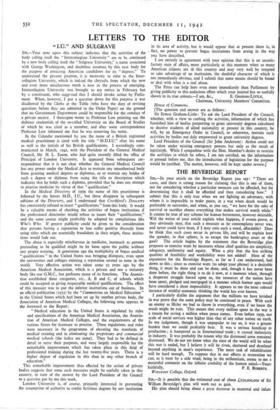THE BEVERIDGE REPORT
SIR,—In your article on the Beveridge Report you say: "There are cases, and there is strong reason for claiming that this is one of them, not for considering whether a particular measure can be afforded, but for determining that it shall be afforded and then considering how." I submit that this is only true when we are fighting an adversary, with whom it is impossible to make peace, in a war when death would be preferable to surrender, and when, as you say, "we have for the sake of survival to sacrifice almost everything that makes survival worth while." It cannot be true of any scheme for human betterment, however desirable. Will the writer of your article explain what happens, if events prove, as they obviously may, that such a measure as he contemplates never was, and never could have been, if I may coin such a word, affordable? Does he think that such cases occur in private life, and will be explain how the spender, in that sphere, is to escape the bankruptcy court or the gaol? The article begins by the statement that the Beveridge plan proposes to exorcise want by measures whose chief qualities are simplicity, adequacy, uniformity and equity. What a pity that the less striking qualities of feasibility and workability were not added! Most of the arguments for the Beveridge Report, as far as I can understand, boil down to this ; since to exorcise want (to adopt your phrase) is a desirable thing, it must be done and can be done, and, though it has never been done before, the right thing is to do it now, at a moment when, through a desperate struggle forced upon us, the resources of the nation have been spent, pledged and mortgaged in a manner which former ages would have considered a sheer impossibility. It appears to me the most colossal instance of wishful economic thinking the world has ever known.
I particularly dislike the argument that the millions we have lavished in war prove that the same policy may be continued in peace. With such an enemy as Hitler we had to throw in everything, even if we knew the result might be ruin. This means that every million spent in the war is a reason for saving a million when peace comes. Even before 1939, our
scale of social services was higher than that of any other nation on earth. In my judgement, though it was unpopular to say so, it was a greater burden than we could profitably bear. It was a serious handicap to production ; it hampered us in International trade ; it caused inelasticity in industry. It was probably the reason why the distressed areas remained distressed. We do not yet know what the state of the world will be when
this war is ended, but I believe it will be riven, shattered and desolated beyond anything in man's experience. The mere task of rehabilitation will be hard enough. To suppose that in our efforts at restoration we can, as it were by a side wind, bring in the millennium, seems to me a mournful comment on the infinite credulity of the human mind.—Yours


























 Previous page
Previous page